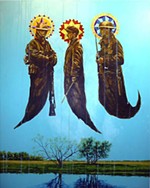‘José Toirac: "Sacrifice"’
Local Arts Reviews
Reviewed by Robert Faires, Fri., Sept. 5, 2003

José Toirac: 'Sacrifice': A Brush Dipped in a Vein
Gallery 106, through Oct. 18
"This is my blood, which is shed for you."
The words of Jesus echo through the hallway at Flatbed World Headquarters, for lining the walls are works which take the fruit of the vine and, in the spirit of the Last Supper, link it with the fluids coursing through our bodies in a way that connects death and life. Here is the face of a Cuban man, his heavy brows, hooded eyes, and thick hair and beard rendered on white paper in a wash of red wine. Here are excerpts from letters written to friends and family members while in the shadow of death, the words penned in red wine. Here is a hole in a wall, more wound than building damage, from which runs down red wine. Here is a large white sheet on which lies the impression of a man's body marked out by red wine. In every case, the wine has dried and taken on the muted burgundy to brown shades of dried blood. It's almost as if a brush had been dipped in an open vein to record the final thoughts or appearance of one destined to surrender his life.
Even without José Toirac's notes to spell out explicitly his intent in using red wine to paint with, the viewer can hardly avoid feeling the connection of wine and blood, and their ties to Christ's Passion. The exhibition title, "Sacrifice," trumpets the artist's theme, and a work such as The Holy Sheet draws much of its impact from our familiarity with the Shroud of Turin.
That said, rooting around in Christian symbolism isn't all that Toirac is interested in. He has blended these allusions to the Passion with the history of his homeland. The fragments of letters come from Che Guevara writing to his parents, his children, and Fidel Castro before leaving Cuba. The figure on the sheet is based on a photograph of Che's dead body.
This may sound to some like sacrilege, an attempt to deify an earthly political figure. But standing in the presence of these works, the feeling is quite different. The simplicity of their presentation -- nothing but the stain of the wine and the occasional pencil line on plain white paper -- gives them a hushed quality. These are reflections on mortality and of a particular kind: one in which death is foreseen and acknowledged, and then accepted as a necessary price to be paid for the freedom of others. That they bind a 20th-century guerilla and the figure many revere as the Son of God need not be blasphemous. Both men were, in fact, revolutionaries whose destinies were bound up in struggles against powerful political regimes. Both saw their deaths coming and sought to serve others even through the spilling of their blood, even if the magnitude of what they gave with their lives was at opposite extremes. In "Sacrifice," José Toirac softly and, to these ears, reverentially asks us to look at those whose blood is shed for others, to find the heroism and power common to them, and, in one sense, at least, to drink to their payment of the ultimate price.










